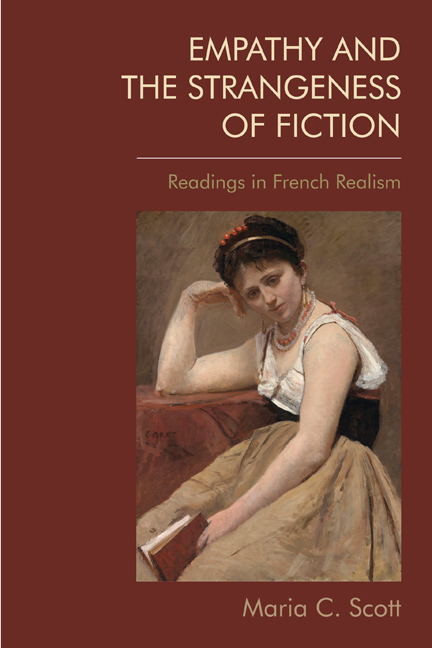Book contents
- Frontmatter
- Contents
- Dedication
- 1 Does Reading Fiction Boost Empathy? Psychological Approaches
- 2 Literary Approaches to Empathy
- 3 Fictional Strangers and the Strangeness of Fiction
- 4 Balzac: The Limits of Transparency and the Dangers of Opacity
- 5 Stendhal and the Two Opposing Demands
- 6 Sand and the Necessity of Suspicion
- 7 Towards an Empathetic Ethics of Fiction-Reading
- Bibliography
- Index
2 - Literary Approaches to Empathy
Published online by Cambridge University Press: 17 October 2020
- Frontmatter
- Contents
- Dedication
- 1 Does Reading Fiction Boost Empathy? Psychological Approaches
- 2 Literary Approaches to Empathy
- 3 Fictional Strangers and the Strangeness of Fiction
- 4 Balzac: The Limits of Transparency and the Dangers of Opacity
- 5 Stendhal and the Two Opposing Demands
- 6 Sand and the Necessity of Suspicion
- 7 Towards an Empathetic Ethics of Fiction-Reading
- Bibliography
- Index
Summary
Reasons for Reticence
While the idea that fictional works have ethical value dates back to Aristotle at least, the recent empirical evidence, outlined in our first chapter, that they nurture empathy and social understanding seems likely to be welcome news for the literary scholar. Teachers of literature, including teachers of literature in a foreign language, like myself, are often required by their managers, and more generally by the laws of the market, to package what they do in the language of employability and transferable skills, so scientific evidence for the quantifiable benefits of studying novels must surely be welcome. However, while it is true that various literary specialists have, in recent years, contributed meaningfully to the debate about whether engagement with literature can improve the empathy of readers, there is not yet much local evidence that university departments of English and modern languages are rewriting their prospectuses or projected learning outcomes to incorporate the new evidence that engagement with literary fiction can enhance the empathic capabilities and social cognition of their students. What explains this apparent modesty?
At first glance, reticence seems an odd attitude. The novel has, after all, been closely associated with the cultivation of sympathy, a forerunner and occasional near-synonym of empathy, for a very long time. George Eliot wrote, for example, that ‘the greatest benefit we owe the artist, whether painter, poet or novelist, is the extension of our sympathies’. For Eliot, art (including novels) offers ‘a mode of amplifying experience and extending our contact with our fellow-men beyond the bounds of our personal lot’. It is nonetheless true that literary scholars do not generally embrace the argument that reading novels makes us more empathetic. This reluctance can be caricatured as intellectual snobbery; it has been argued for example by one prominent commentator that literary scholars consider the idea of ‘the reading of fiction as an empathy expander and a force toward humanitarian progress’ to be ‘too middlebrow, too therapeutic, too kitsch, too sentimental, too Oprah’. Let us analyse this alleged phobia of the middlebrow and the sentimental on the part of literary scholars.
Firstly, every student and specialist in the field of literary studies knows that the very first rule of being a good reader is the maintenance of a degree of critical distance.
- Type
- Chapter
- Information
- Empathy and the Strangeness of FictionReadings in French Realism, pp. 19 - 41Publisher: Edinburgh University PressPrint publication year: 2020



